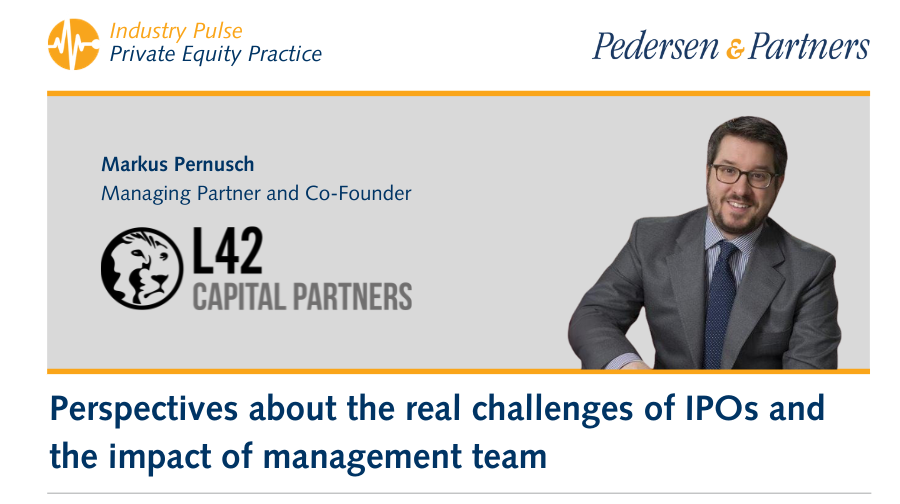Markus Pernusch on the challenges of IPOs and the impact of management team
The Private Equity team at Pedersen & Partners recently had the opportunity to host Markus Pernusch, co-founder, and Managing Partner of L42 Capital Partners.

Markus, an experienced investment banker, shared insights into current IPO market trends and challenges faced by management teams. L42 Capital Partners follows a collaborative decision-making approach and provides value to entrepreneurs. Markus highlighted L42’s entrepreneurial approach, actively participating in investments and offering services that range from advising on strategic buyers to IPOs and capital raisings.
Markus provided a comprehensive overview of the IPO landscape, emphasizing the hurdles faced by companies aiming to go public. Although 2022 was a challenging year, certain sectors such as life sciences, technology, and financial services remained active in terms of IPOs. Notably, there was a substantial decrease in Special Purpose Acquisition Companies (SPACs), with their volume dropping by about 60%, and the performance of SPAC IPOs completing mergers in 2022 was disappointing, with an average loss of 59%.
Looking ahead, Markus stressed that the 2023 IPO market has been dependent on the Federal Reserve’s ability to reduce inflation and decrease volatility. Recent events in the European IPO market, such as the collapse of SVB and the takeover of Credit Suisse, raised concerns, impacting investor caution. Markus advised companies to focus on liquidity and alternative resources, recommending consideration of private capital options.
Markus highlighted the importance of being prepared for the IPO market and urged companies not to wait for the IPO window but to proactively ready themselves for when the opportunity arose. He outlined the four pillars of a successful IPO: placement, liquidity, exit expectations, and meeting the market, cautioning against overpricing.
Before discussing management challenges, Markus briefly touched on why companies opt for IPOs, citing independent financing, broadening investor bases, and immediate access to equity. He emphasized the positive PR and market recognition effects, terming it "joining the master class."
Moving on to management challenges, he emphasized that an IPO is not just a singular event but rather the initiation of a lengthy and transformative journey. He highlighted the need for a robust capital markets team and the profound impact of an IPO on a company's DNA, underscoring the importance of internal stability and effective communication.
Markus passionately stressed the danger of rushing to go public without adequate internal groundwork. He cautioned against being excessively pushed by favourable market conditions without having the necessary internal processes, capabilities, and foundational changes in place. He asserts that preparation for an IPO should extend beyond mere compliance with the listing requirements and should instead constitute a comprehensive transformation of various aspects within the company.
Regarding the management's ability to articulate the equity story, Markus emphasized the need for effective and consistent communication of the company's uniqueness. He stressed that the story should not be revised with every market fluctuation but should align with investor interests in a broader sense.
Markus explained that to tackle communication challenges, it is necessary to implement a clear policy that takes diverse audiences into consideration, and that the disclosure of material information should be simultaneous for all investors. He also raised questions about the readiness of the executive team and the board, emphasizing the need for independent directors with diverse skills and experience, particularly in capital markets.
Markus ended his presentation with a summary of the challenges facing management, agreeing that it is easiest for an investor to judge management at the point of sale. He emphasized that the IPO journey requires diligence, preparation, the right team, and, above all, credibility that cannot be bought. He concluded by reiterating the importance of dedicated preparation for the complex process of going public.
